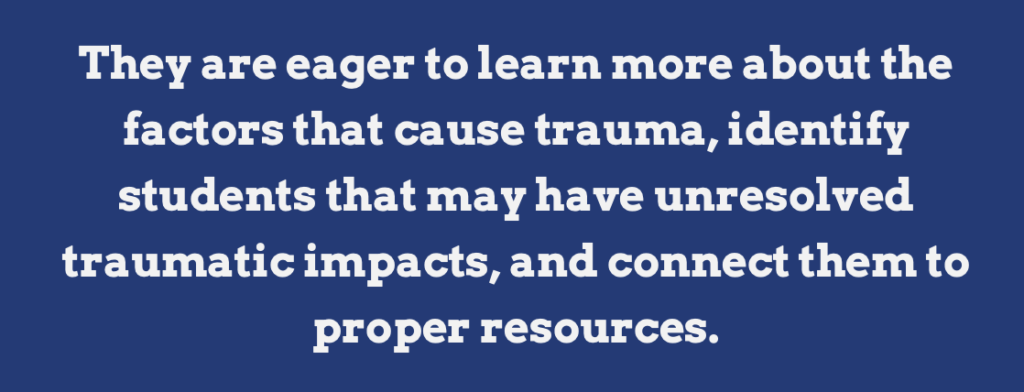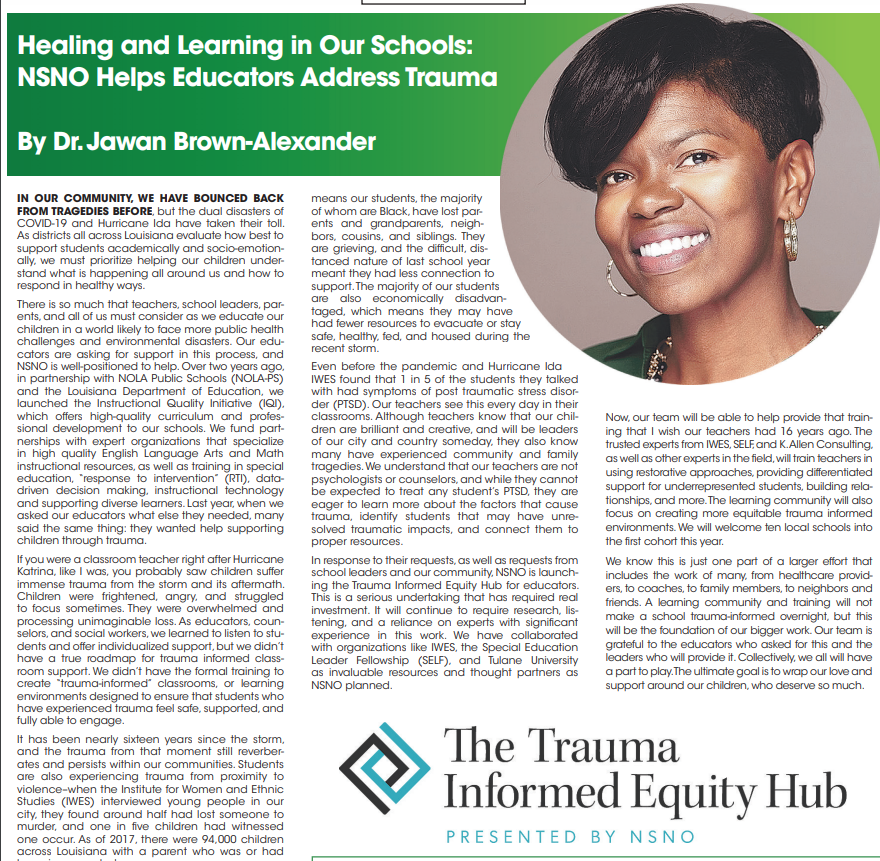The October 19th issue of Gambit included the following sponsored article on the newly-launched Trauma Informed Equity Hub written by NSNO’s Chief Schools Officer, Dr. Jawan Brown-Alexander.
In our community, we have bounced back from tragedies before, but the dual disasters of COVID-19 and Hurricane Ida have taken their toll. As districts all across Louisiana evaluate how best to support students academically and socio-emotionally, we must prioritize helping our children understand what is happening all around us and how to respond in healthy ways.

There is so much that teachers, school leaders, parents, and all of us must consider as we educate our children in a world likely to face more public health challenges and environmental disasters. Our educators are asking for support in this process, and NSNO is well-positioned to help. Over two years ago, in partnership with NOLA Public Schools (NOLA-PS) and the Louisiana Department of Education, we launched the Instructional Quality Initiative (IQI), which offers high-quality curriculum and professional development to our schools. We fund partnerships with expert organizations that specialize in high quality English Language Arts and Math instructional resources, as well as training in special education, “response to intervention” (RTI), data driven decision making, instructional technology and supporting diverse learners. Last year, when we asked our educators what else they needed, many said the same thing: they wanted help supporting children through trauma.

If you were a classroom teacher right after Hurricane Katrina, like I was, you probably saw children suffer immense trauma from the storm and its aftermath. Children were frightened, angry, and struggled to focus sometimes. They were overwhelmed and processing unimaginable loss. As educators, counselors, and social workers, we learned to listen to students and offer individualized support, but we didn’t have a true roadmap for trauma-informed classroom support. We didn’t have the formal training to create “trauma-informed” classrooms, or learning environments designed to ensure that students who have experienced trauma feel safe, supported, and fully able to engage.
It has been sixteen years since the storm, and the trauma from that moment still reverberates and persists within our communities. Students are also experiencing trauma from proximity to violence–when the Institute for Women and Ethnic Studies (IWES) interviewed young people in our city, they found around half had lost someone to murder, and one in five children had witnessed one occur. As of 2017, there were 94,000 children across Louisiana with a parent who was or had been incarcerated.
This trauma is only compounded by the devastation of COVID-19 and Hurricane Ida. Due to systemic inequities in healthcare access, our Black and Brown community members have faced infection and loss from the virus at disproportionate rates. This means our students, the majority of whom are Black, have lost parents and grandparents, neighbors, cousins, and siblings. They are grieving, and the difficult, distanced nature of last school year meant they had less connection to support. The majority of our students are also classified by the state as “economically disadvantaged,” which means they may have had fewer resources to evacuate or stay safe, healthy, fed, and housed during the recent storm.
Even years before the pandemic and Hurricane Ida, IWES found that 1 in 5 of the students they talked with had symptoms of post traumatic stress disorder (PTSD). Our teachers see this every day in their classrooms. Although teachers know that our children are brilliant and creative, and will be leaders of our city and country someday, they also know many have experienced community and family tragedies. We understand that our teachers are not psychologists or counselors, and while they cannot be expected to treat any student’s PTSD, they are eager to learn more about the factors that cause trauma, identify students that may have unresolved traumatic impacts, and connect them to proper resources.

In response to their requests, as well as requests from school leaders and our community, NSNO is launching the Trauma Informed Equity Hub for educators. This is a serious undertaking that has required real investment. It will continue to require research, listening, and a reliance on experts with significant experience in this work. We have collaborated with organizations like IWES, the Special Education Leader Fellowship (SELF), and Tulane University as invaluable resources and thought partners as NSNO planned.

Now, our team will be able to help provide that training that I wish our teachers had 16 years ago. The trusted experts from IWES, SELF, and K. Allen Consulting, as well as other experts in the field, will train teachers in using restorative approaches, providing differentiated support for underrepresented students, building relationships, and more. The learning community will also focus on creating more equitable trauma informed environments. We will welcome ten local schools into the first cohort this year.

We know this is just one part of a larger effort that includes the work of many, from healthcare providers, to coaches, to family members, to neighbors and friends. A learning community and training will not make a school trauma-informed overnight, but this will be the foundation of our bigger work. Our team is grateful to the educators who asked for this and the leaders who will provide it. Collectively, we all will have a part to play. The ultimate goal is to wrap our love and support around our children, who deserve so much.
